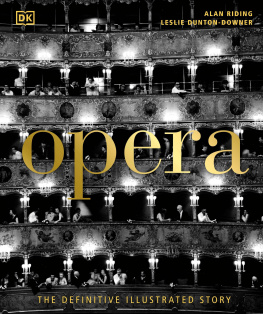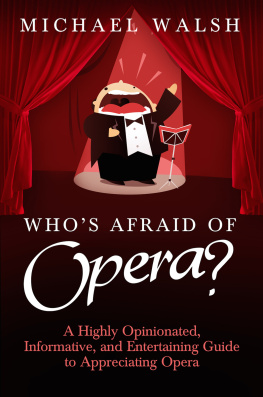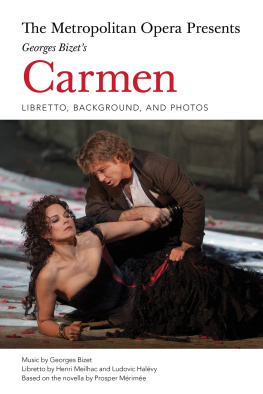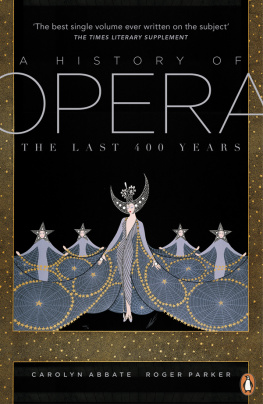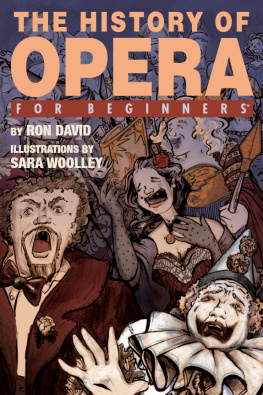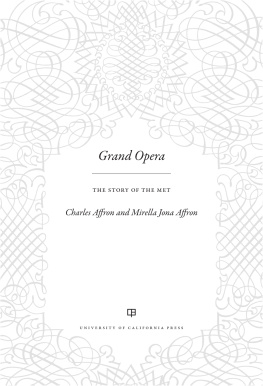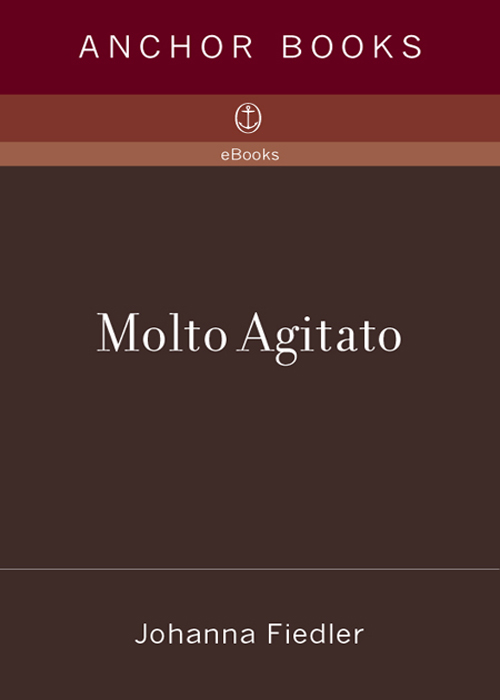
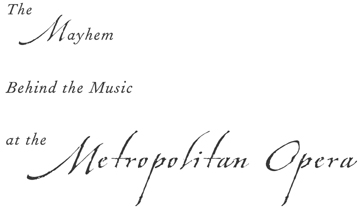
ANCHOR BOOKS
A DIVISION OF RANDOM HOUSE, INC.
NEW YORK
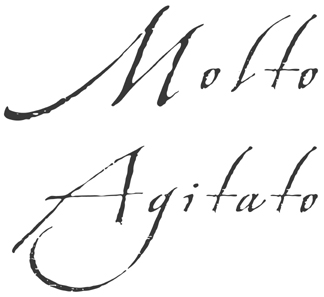
JOHANNA FIEDLER
CONTENTS
In memory of my father,
who loved music, books, and dogs
CHRONOLOGY
1854 The Academy of Music opens.
1883 The Metropolitan Opera opens with a performance of Faust in the new opera house at Broadway and Thirty-ninth Street.
1903 Enrico Caruso makes his debut in Rigoletto. Otto Kahn joins Met board; he will become its most influential member for the next quarter-century.
1908 Opening of the twenty-fifth anniversary season and debut of new general manager Giulio Gatti-Casazza and conductor Arturo Toscanini.
1931 First Met radio broadcast; Hnsel und Gretel is broadcast nationwide.
1935 Mrs. August Belmont, the first woman named to the Metropolitan board, founds the Metropolitan Opera Guild.
1941 After the bombing of Pearl Harbor, the United States enters World War II; Madama Butterfly is banned for the duration of the war.
1949 Rudolf Bing named as general manager, remaining in the position for the next twenty-three years.
1955 Marian Anderson makes her Metropolitan Opera debut in Un Ballo in Maschera, becoming the first African-American principal artist in the Mets history.
1961 Bitter labor dispute develops between Met board, administration, and orchestra; strike averted by the last-minute intervention of secretary of labor Arthur Goldberg.
1966 New Opera House opens at Lincoln Center with world premiere of Samuel Barbers Antony and Cleopatra; only just before the performance, the Met reaches a settlement with its recalcitrant musicians.
1968 Plcido Domingo makes his Met debut as a last-minute substitute for Franco Corelli in Adriana Lecouvreur. Luciano Pavarotti makes his debut in La Bohme.
1969 Labor impasse with Met Orchestra forces latest opening night in the companys history.
1970 Goeran Gentele named to succeed Bing. He chooses Rafael Kubelik as his music director.
1971 James Levine makes his Met debut conducting Tosca at the June Festival. Shortly afterward, he is named principal conductor, to assist Kubelik.
1972 Gentele is killed in an automobile accident: his assistant, Schuyler Chapin, is named acting general manager.
1975 Board dismisses Chapin, leaving Anthony Bliss in charge. James Levine is named music director, part of a triumvirate including Bliss and John Dexter (director of production).
1977 First Live from the Met telecast of LaBohme, with Renata Scotto and Luciano Pavarotti.
1980 Violinist Helen Hagnes murdered backstage; Craig Crimmins, a stagehand, is eventually arrested and convicted of the crime. Labor dispute with the orchestra shuts down the first three months of the 198081 season. Joseph Volpe emerges from the shambles of the managements negotiations to become a major player.
1981 Zeffirellis new La Bohme ushers in new Met aesthetic of flamboyant, conservative productions, many underwritten by Mrs. Donald D. Harrington.
1983 James Levine named artistic director at start of the Centennial season.
1983 The Met celebrates its one hundredth anniversary with a two-part marathon concert televised live nationally and internationally.
1984 Bruce Crawford named new general manager, replacing Anthony Bliss. Mrs. Gilbert W. Humphrey replaces him as board president, becoming the first woman to hold that position.
1988 Crawford unexpectedly resigns as general manager.
1990 Joseph Volpe is named general director, a substitute title for general manager.
1991 James Levine conducts John Coriglianos The Ghosts of Versailles, the Mets first world premiere in a quarter-century. This began an era of new experimentation in repertory and production style.
199293 Joseph Volpe finally is given the title of general manager, a vote of confidence from the formerly dubious board.
1994 Volpe fires Kathleen Battle, one of Levines favorite singers, producing speculation that he has won the supposed power struggle between himself and Levine.
1997 The Met announces the appointment of Valery Gergiev to the newly created position of principal guest conductor.
1998 Alberto Vilar makes a gift of $25 million to launch the Mets new $300 million endowment campaign. It is the first well-publicized gift that Vilar has made; in the next three years, he will become a famous arts philanthropist.
2001 The World Trade Center is attacked, causing enormous emotional and financial difficulties for New York City. The Met is no exceptionbox office sales drop by 8 percent.
2001 James Levine is named music director of the Boston Symphony, beginning in 20042005. At that time, he will become the Mets music director rather than its artistic director.
2002 Alberto Vilar reneges on a $20 million endowment fund gift.
2002 Bruce Crawford is named chairman of Lincoln Center. Beverly Sills, his predecessor in the post, becomes chairman of the Metropolitan Opera.
Preface
The fifteen years I spent at the Metropolitan Opera were among the most interesting of my life. From the first day I walked in the stage door, I felt at home in the opera house. Life there was lived on a lavish scale; it was a world populated by larger-than-life characters who behaved as though they lived in an opera. Tempers raged, love affairs flourished, rivalries thrived, all at top volume. There was cruelty but there was also kindness, greed but also generosity, ambition but also self-sacrifice. The one thing there never was was silence.
This is not a book about opera; it is a study of the politics of an institution. I have made an attempt to open up the Metropolitans world and study the three main forces that propel it: the artistic, the financial, and the social. The singers who have been included are a rather arbitrary list; several of my own favorites have been left out. But the singers who are in the book are all people who have influenced what has happened at the Met, usually because of their power to fill the theater.
The Metropolitan Opera has been described often as a closed world, as impervious to outsiders as the Kremlin or the Vatican. As the companys general press representative, I saw all aspects of the company from the stage crew to the orchestra to the board of directors. Behind the gold curtain is a world that is very human, although human on a grand scale. It was a privilege to be part of that world for the time I was at the Met.
Prologue
THE LONGEST CONCERT
So many singers were at the Met on the evening of April 27, 1996, when James Levine stepped into the orchestra pit, that the audience openly speculated what other opera houses could possibly be doing the same evening. The occasion was the celebration of Levines twenty-fifth anniversary at the Metropolitan Opera. Twenty-five years earlier, when he was twenty-seven, he had made his first appearance, leading Puccinis Tosca. During the intervening years, Levine had presided over fifteen hundred performances of sixty-eight operas, a record unlikely to be surpassed.
Everyone in the opera house had wondered which work he would choose to celebrate his silver anniversaryhis repertory at the Met had covered almost every style and school. But Levine savors excess in all parts of his musical life; any man capable of conducting a matinee of Verdis five-hour
Next page

